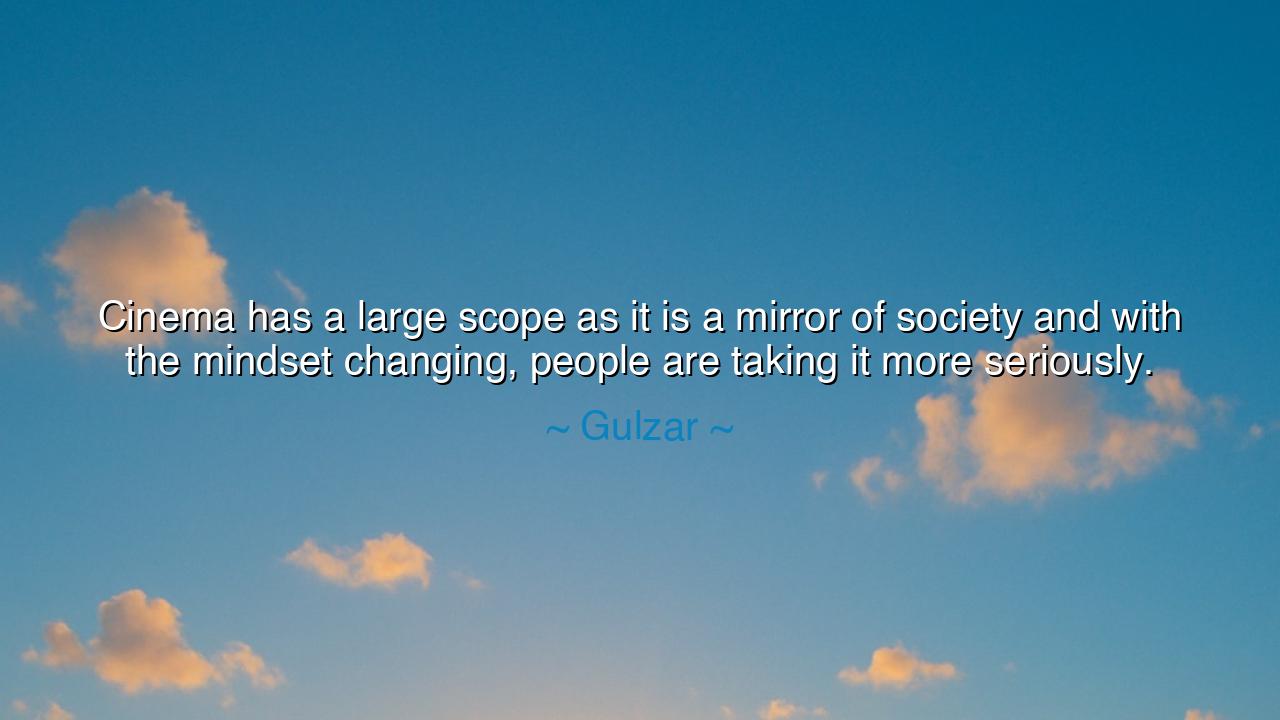
Cinema has a large scope as it is a mirror of society and with
Cinema has a large scope as it is a mirror of society and with the mindset changing, people are taking it more seriously.






Gulzar, poet of the screen and seer of human hearts, once proclaimed: “Cinema has a large scope as it is a mirror of society, and with the mindset changing, people are taking it more seriously.” These words are not mere praise of an art form but an acknowledgment of its immense power. For cinema does not exist in isolation—it breathes the same air as the people, reflects their dreams and despairs, and often gives voice to truths that otherwise remain unspoken.
The meaning of his words lies first in the image of the mirror. A mirror does not invent, it reveals. In the same way, cinema reveals what is already present within the fabric of life: injustice and love, conflict and hope, sorrow and triumph. A society that watches cinema is in truth gazing upon itself—its virtues and its flaws magnified on the silver screen. As the mindset of people changes, so too does what they demand from cinema. No longer satisfied with fantasy alone, they seek truth, representation, and meaning. Thus, cinema grows from entertainment into responsibility.
History offers us stirring examples of this. In 1940, Charlie Chaplin released The Great Dictator, a film that dared to mock the cruelty of fascism at a time when the world trembled under its shadow. Though disguised as comedy, it was in truth a profound act of resistance—a mirror of society held up to reveal the madness of tyranny. Through cinema, millions found courage and clarity, proof that art could stand as a weapon against oppression. Here Gulzar’s wisdom is confirmed: when people take cinema seriously, it becomes more than spectacle—it becomes history’s conscience.
In India too, the land from which Gulzar speaks, cinema has often served as a voice for the voiceless. Films like Mother India did not simply tell stories—they embodied the struggles and resilience of a newly independent nation. Later, directors like Satyajit Ray and Shyam Benegal crafted films that portrayed poverty, inequality, and human dignity with honesty. These films were not escapism but revelation, shaping how society understood itself and how the world perceived India. They proved that cinema’s scope is vast because human life itself is vast.
Yet Gulzar’s words also contain a challenge. If cinema is a mirror, then it can only reflect what is placed before it. A corrupt society that craves distraction may demand only shallow spectacle. But when the mindset shifts—when people hunger for truth, justice, and depth—cinema must rise to meet that hunger. Thus, its seriousness grows not only from the artist’s vision but also from the audience’s demand. The change of mindset is therefore a collective awakening: people realize that what they watch shapes what they become.
The lesson for us is profound. Do not treat cinema as a trivial pastime, for it is a vessel of values, a teacher of morals, a shaper of dreams. Ask of it not only entertainment but truth. Support films that reflect justice, empathy, and courage, rather than those that glorify emptiness. And if you are a creator, remember that your work is part of the mirror of society—you hold in your hands the power to reveal, to challenge, and to inspire.
Practical action flows from this truth. Choose carefully what you consume. Discuss films not only for their glamour but for their message. Encourage stories that uplift, question, and illuminate. And in your own life, live as though you too were part of a grand cinema, conscious that the way you act will be reflected in the great mirror of time.
Thus let Gulzar’s words endure: “Cinema is a mirror of society, and as the mindset changes, people take it more seriously.” Remember this, and you will see that cinema is not only art but prophecy, not only amusement but memory. For in the flickering light of the screen, whole generations come to see themselves—and in that seeing, they are transformed.






AAdministratorAdministrator
Welcome, honored guests. Please leave a comment, we will respond soon